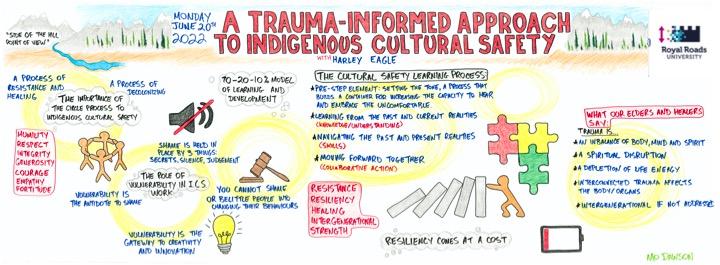A Trauma-Informed Approach to Cultural Safety
Topics
Featured
Share online
In this webinar explores Indigenous Cultural Safety (ICS) through a trauma-informed lens.
Harley Eagle offers insights into:
- Foundational understandings of Indigenous Cultural Safety which would include a description of a cultural safety learning journey.
- Foundational understanding of the colonial history of Canada from Indigenous perspectives.
- Foundational understandings of Systemic Racism and its connection to colonization.
- Understanding of and actions to address systemic racism at the personal, intra-personal, classroom, and institutional levels.

Graphic recording by Mo Dawson
Meet Harley:
Harley Eagle is Dakota and Ojibway, and a member of Whitecap Dakota First Nation. He looks to Indigenous life ways to guide his work as an Indigenous Cultural Safety (ICS) consultant. His experience includes working for the Island Health Authority as a Cultural Safety Facilitator, consulting and training in the fields of transforming conflict, anti-racism, dismantling oppression, cultural safety and trauma healing. He is often invited to speak at conferences both nationally and internationally and works with clients across several sectors. Harley is a Knowledge Keeper and the Indigenous Scholar in Residence for the Master of Arts in Leadership Health Specialization and resides on Vancouver Island.
Resources:
Graphic recording - A Trauma-Informed Approach to Cultural Safety by Mo Dawson
Indigenous Cultural Safety (ICS) Resource List
Thank You:
This is the first episode of the Decolonizing Leadership Webinar Series, hosted by the Master of Arts in Leadership - Health Specialization. This series explores important leadership topics from Indigenous perspectives and seeks to deepen relationships with Indigenous knowledge and ways of being and doing and encourage all leaders to consider how we can transform our leadership practices. This series is funded by the Exploring New Ways Funding stream which supports curriculum innovations to increase Indigeneity and understanding.